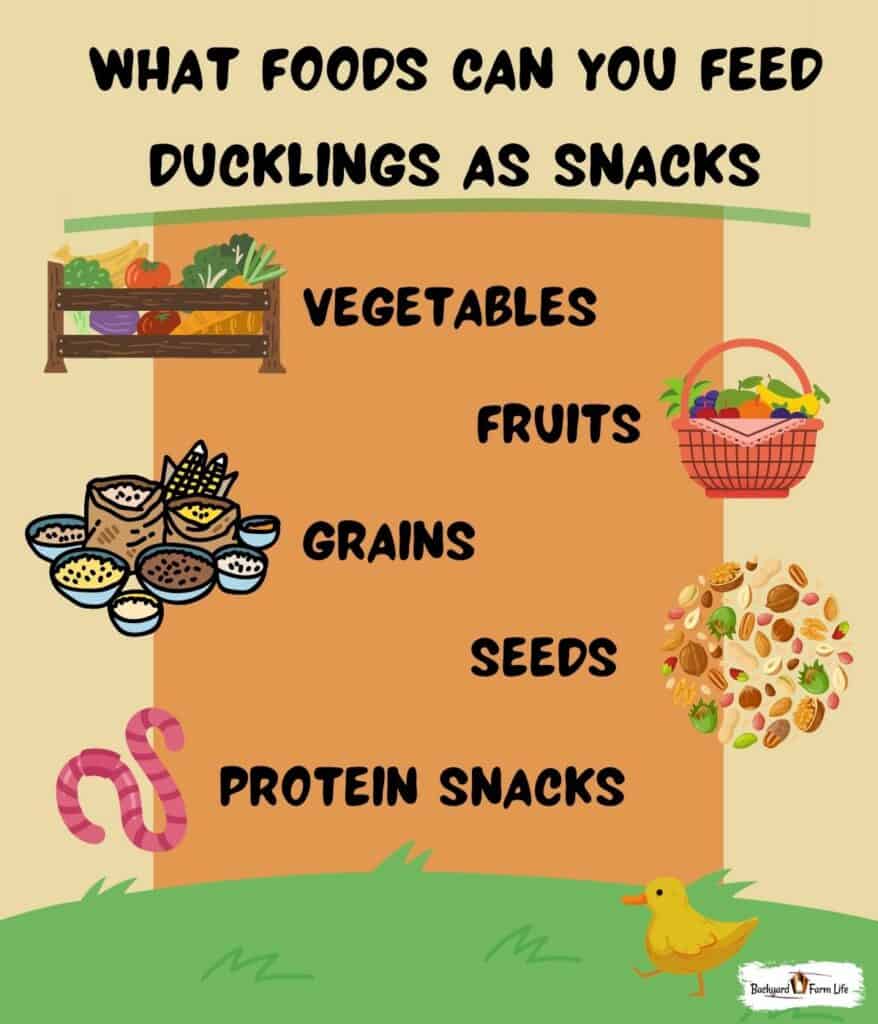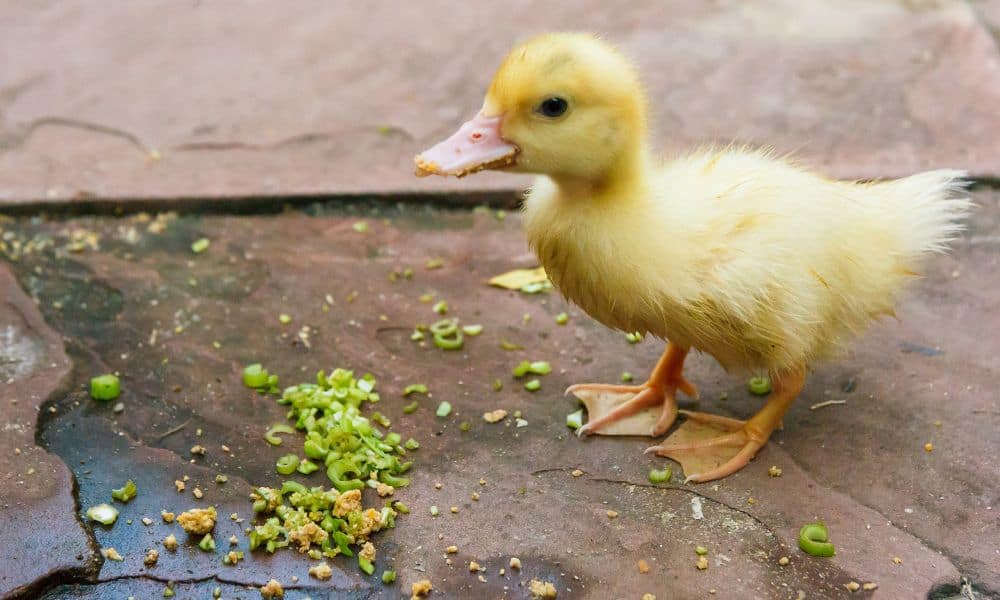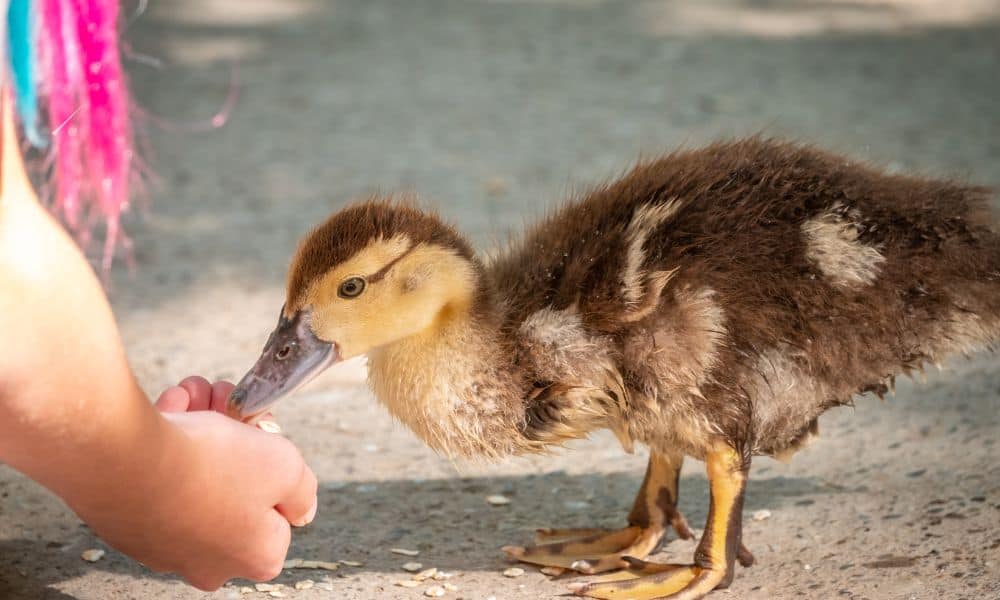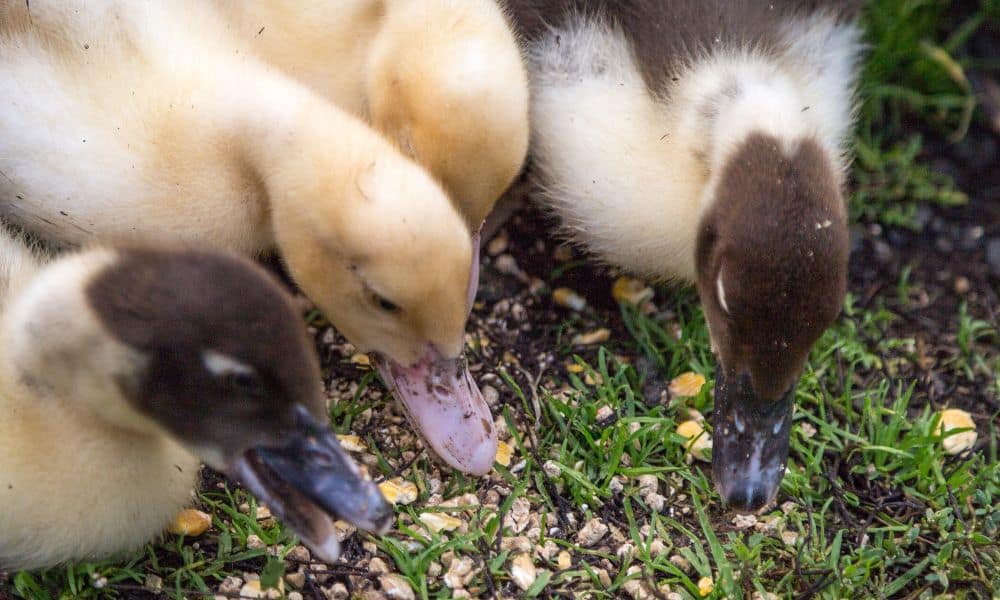The charm of a duckling is like no other.
I feel like you can’t help but give them everything they want!
But, when it comes to feeding ducklings you’ve got to apply a mother duck mentality and only provide them with foods that are safe and actually healthy for them to eat – including for their snacks and treats.
So, whether you’re raising your own backyard ducklings or wanting to give a treat to the cute ducklings at the park, here’s exactly what foods you can feed ducklings as snacks, which you should avoid, and what you should be aware of first.
Contents
What Foods Can You Feed Ducklings As Snacks

As a general rule to follow, you should always limit snacks and treats to no more than 10% of your ducklings’ daily diets.
But, you can still use this 10% as a way to introduce a bit of variety in your duckling diets, providing healthy nutrient-filled foods as snacks and treats!
Whenever you’re feeding snacks or treats to ducklings always make sure you chop up, mash, or cut your foods into very small, bite-sized pieces to reduce the risk of choking and to aid with their digestion.
You can even soak some foods in water to make them softer and easier for ducklings to swallow.
In terms of which foods are considered healthy and safe, well, let’s just say it’s time to ditch the bread. Instead, here are 25 common foods you can feed ducklings as snacks.
Vegetable Snacks For Ducklings

1. Cucumber
2. Zucchini
3. Celery
4. Lettuce
5. Kale
6. Peas
Vegetables To Avoid Feeding Ducklings
Generally, you should avoid any vegetables which are too tough for your ducklings to consume – unless they’ve been cooked or softened first.
Avoid nightshade vegetables like potatoes, rhubarb, or eggplant (particularly the leaves/stems which are toxic).
It’s imperative that you finely chop or dice your vegetables as small as you physically can before offering them to your ducklings for consumption – just to eliminate any risk of choking or indigestion.
Fruit Snacks For Ducklings
7. Blueberries
8. Blackberries
9. Mashed bananas
10. Peaches
11. Plums
12. Watermelon
Fruits To Avoid Feeding Ducklings
Ducklings can’t tolerate citrus fruits (including lemons, oranges, and grapefruit) due to their high sugar and acidity content, and citrus fruits can even be harmful to older ducks too.
Avoid fruits like mangos and avocados, and limit pitted fruits too (or at least remove the pits entirely before offering them to your ducks).
Although fruits are generally soft, be sure to mash them up or offer them in small bite-sized pieces!
Grain Snacks For Ducklings

13. Oats
14. Unprocessed whole-grain cereals
15. Quinoa
16. Mung Beans
Grains To Avoid Feeding Ducklings
Any type of bread should generally be avoided. Although soft, wet pieces of bread can be tolerated by ducklings it doesn’t offer them much from a nutrient perspective.
Avoid cooked or uncooked pasta, white or brown rice, and any crisps or crackers. Although adult ducks can snack on these foods safely, they can be unsafe for ducklings to consume even as treats.
Never feed ducklings any kind of processed or sugary cereals. In saying that, there are some whole-grain cereals that are still safe for duckling consumption.
Seeds Snacks For Ducklings

Regardless of their size, all seeds should be crushed before offering them to your ducklings for consumption – just to limit the risk of choking and to aid in digestion.
17. Chia seeds
18. Flax seeds
19. Sunflower seeds
20. Poppy seeds
Protein Snacks For Ducklings:
21. Mealworms
22. Earthworms
23. Crickets
24. Boiled or scrambled eggs
25. Feeder fish
Why You Should Refrain From Feeding Wild Ducklings
If you’re raising your own backyard ducklings then you can be a bit more lenient with how many snacks and treats you can feed them (up to a maximum of 10% of their daily diets).
But, if you’re considering feeding any wild ducklings, you should first be conscious of the consequences and ensure you’re only feeding them in extreme moderation or under specific circumstances.
This is because the more you feed wild ducklings, the more they will be normalized to being fed by humans, and less incentivized to forage for their food or to learn from their mothers.
This can have some devastating effects on a duckling’s health and well-being during its development and into adulthood.
So, it’s imperative that you not make a habit of feeding wild ducklings.
Why You Shouldn’t Feed Ducklings Too Many Snacks
Although poultry owners become accustomed to feeding their flocks any and all table scraps, you should always be more cautious with younger birds.
As a general rule when feeding baby chicks or ducklings, the younger they are the more restrictive you should be with their diets.
This is because they are at the most vulnerable during these younger ages, and benefit so much more from a healthy and controlled diet to aid in their development.
All in all, it’s crucial you limit the number of snacks and treats you feed your ducklings to a maximum of 10% of their daily diets AND ensure the snack foods you’re feeding them are actually healthy.
Otherwise, feeding ducklings too many snacks can lead to:
- Impaired Development
- Less Foraging Behaviors
- Fussy Ducks
Impaired Development
Ducklings grow so quickly, particularly over the first few weeks of their life.
To develop normally at such a fast pace ducklings require a high amount of protein (from 18-22%) as well as a steady supply of other vital macro and micronutrients.
Although many snacks and treats are considered healthy for ducklings, they don’t accommodate everything a growing duckling needs to develop optimally.
Ducklings that don’t receive their required nutrients can end up with impaired development in the form of weaker immune systems, bone or muscular issues, deformities, or sickness.
Less Foraging Behaviors
Foraging is a vital behavior that all ducks should possess and the learning starts when they are young ducklings!
Not only does foraging encourage them to exercise, but it helps them get more time in direct sunlight (which has its own benefits), and consume many healthy, organic substances from grass to insects.
The more treats and snacks you feed your ducklings, the less driven they are to go and forage to fill themselves up with natural snacks!
Fussy Ducks
Treats and snacks excite ducks like nothing else. They’ll literally come screaming and quacking from all across your backyard just to keep a peek at what you’ve got for them.
If you feed your ducklings too many treats it conditions them to expect them. This discourages them to fill up on their normal feed or forage less, knowing that they’ll be getting some tasty morsels from you at some point.
This isn’t a habit you want to build in your ducks, as they’ll start eating less and less of their normal food and want more and more treats!
Quick Recap
So, just like their mother ducks, ducklings can actually eat a wide variety of healthy and nutritious foods.
Although 90% of a duckling’s diet should be from normal food sources like duckling feed/chick starter or from foraging behavior, the remaining 10% can be made up of a variety of healthy and nutrient-packed snacks.
In fact, you can feed ducklings vegetables, fruits, grains, seeds, and protein-based foods as snacks and treats, so long as you ensure they’re small enough and soft enough for your ducklings to safely consume.
Still, there are plenty of foods to avoid, so it’s worth familiarizing yourself with what ducklings CAN eat and CAN’T eat as snacks.
